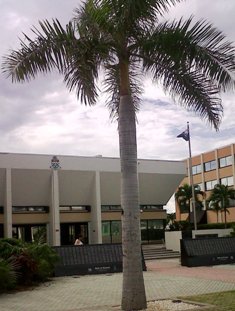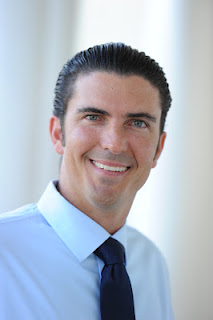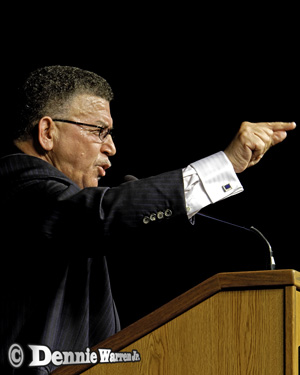Archive for May 14th, 2012

‘Hopeless case’ thrown out
 (CNS): An attempt by the crown to prosecute a local mechanic for perverting the course of justice in a fatal hit and run case was thrown out by a Grand Court judge Monday after the crown presented a particularly weak case. Justice Alex Henderson told the prosecuting counsel his case “was hopeless” after he heard the crown’s evidence against the accused man, whom he discharged less than three hours after the case opened. The public prosecutors had contended that Lancelot Ming had tried to conceal a fender when he learned it was from the car involved in the killing because he had placed it on the top of a container at his garage.
(CNS): An attempt by the crown to prosecute a local mechanic for perverting the course of justice in a fatal hit and run case was thrown out by a Grand Court judge Monday after the crown presented a particularly weak case. Justice Alex Henderson told the prosecuting counsel his case “was hopeless” after he heard the crown’s evidence against the accused man, whom he discharged less than three hours after the case opened. The public prosecutors had contended that Lancelot Ming had tried to conceal a fender when he learned it was from the car involved in the killing because he had placed it on the top of a container at his garage.
On behalf of the crown, Michael Snape presented no evidence that Ming had actually intended to deliberately hide the fender from the police or that he had tried to throw it away and admitted that the mechanic had, when the appropriate opportunity arose, told the police who was driving the car.
Just a day or so after he had learned that the fender came from the vehicle that had mowed down Quindel Ames (55) on a West Bay pedestrian crossing in December 2007, Ming revealed that he was told by the car’s owner, Mark Jefferson, that he was driving when Ames was killed. He also told the police that he had the fender, which had been damaged in the accident, at his garage in George Town and took police to where it was.
Ming admitted going to Jefferson’s yard on what turned out to be the morning after the accident on Sunday 16 December, where he helped take off the fender from the vehicle, but at the time he did not know the car had been involved in a fatal hit and run. He said Jefferson had told him his girlfriend had "mash-up the car" and asked him to repair the fender. Ming said that Jefferson had also given him the wheels from the vehicle in payment for other work the mechanic was doing for him on a different car.
The crown claimed that when Ming received a call from Jefferson a few days later, he had tried to discard and conceal the offending car part by putting it on top of the container. However, Ming soon told the police what he knew about the crime and the whereabouts of the car part. In his statement he said he had not known before the phone call that Jefferson was involved in the killing or that the fender was important to the investigation.
Although he had not mentioned the fender in his first statement to the police, Ming said later that this was because he was being interviewed in a place where he could be overheard. It was not until the following day that he spotted CI Courtney Myles at the police station, who was at the time head of traffic and an officer that Ming knew, that he felt comfortable saying Jefferson was the hit and run driver and that he had the fender at his garage.
Justice Henderson, who was presiding over the trial alone without a jury, said that in his view there was not and “could not be any case to answer” over the concealment of the fender on the evidence presented by the crown. The judge pointed out that by placing the fender on the container the accused had made it no less visible than if he had left it on the ground or anywhere else and there was no evidence of any intent to interfere with the investigation.
During the presentation of the crown’s evidence it was revealed that the police had arrested Jefferson for killing Ames as a result of the discovery of beads and sequins on his car which matched the deceased woman's dress. The car was seized by police after it was found in Jefferson’s yard at his home in Watercourse Road, without wheels, on blocks with a missing fender and damage to the front headlights.
Jefferson was arrested for the road crime but never admitted to the police that he was driving and he was never charged with the killing. Jefferson was shot dead some seven months later outside Kelly’s Bar, West Bay, in a gang related shooting that has never been solved. Jefferson, who was 23 when he was murdered, was a close friend of Damion Ming, the brother of the mechanic, and was alleged to be a member of the Logwoods gang.

Arch beats out women nominees for 2012 YCLA
 (CNS): Currently General Manager of National Concrete, 36-year-old Garth Arch received the Young Cayman Leadership Award 2012 on Saturday. The only man nominated this year, Arch beat Dara Flowers Burke, Casandra Morris, Orchid Morrison and Samantha Widmer. Taking the title from the 2011 winner, Natalie Urquhart, he joins a growing list of Caymanians who have spent a year as a local role model inspiring young people. As the chair of the Children and Youth Services (CAYS) board, Arch is already involved with troubled youth, and as the first a Honorary Consul of Spain in Cayman, he developed a new scholarship for young Caymanians to study in that country.
(CNS): Currently General Manager of National Concrete, 36-year-old Garth Arch received the Young Cayman Leadership Award 2012 on Saturday. The only man nominated this year, Arch beat Dara Flowers Burke, Casandra Morris, Orchid Morrison and Samantha Widmer. Taking the title from the 2011 winner, Natalie Urquhart, he joins a growing list of Caymanians who have spent a year as a local role model inspiring young people. As the chair of the Children and Youth Services (CAYS) board, Arch is already involved with troubled youth, and as the first a Honorary Consul of Spain in Cayman, he developed a new scholarship for young Caymanians to study in that country.
Later this year Arch plans to join the family business, where he will follow in his father’s footsteps as Managing Director of Arch and Godfrey. Aside from CAYS, Arch is Chairman of the Trade and Business Licensing Board, Chairman of the Planning Committee for the Governor’s Award for Design and Construction Excellence, and immediate Past-President of the Cayman Society of Architects, Surveyors and Engineers (CASE). He is also a member of the Rotary Club of Grand Cayman Sunrise and a member of First Baptist Church, so adding this latest commitment to his list could make 2012 a busy year for the qualified civil engineer.
Arch received his award at the annual YCLA gala at the Ritz Carlton on Saturday evening “It’s a tremendous honour. I feel humbled to receive the award,” said Arch, as he received his award. “I want to use YCLA as a platform to reach out to as many of the young people in this country as I can.”

Legal training for law school graduates based on merit
(CNS Business): The Cayman Islands Law Society is committed to ensuring that as many Caymanian students as possible are given the opportunity to qualify as attorneys-at-law, according to its president, Charles Jennings. At a time when, due to the global recession, it is getting harder for law graduates in England to obtain training contracts with law firms, Cayman firms actually maintained, and in some cases even increased, the number of positions on offer, he noted. Responding to the attorney general’s recent speech in the Legislative Assembly calling for members of the islands’ legal fraternity to face their moral obligation to train the next generation of lawyers, Jennings pointed out that obtaining Articles is not a right for law graduates but is earned on merit and is subject to supply and demand. Read more on CNS Business

CINICO clarifies criteria for home health care cover
 (CNS): The government owned health insurance company has said that it has received a number of queries over its Home Health Care (HHC) benefit and has recognised that members may have some misconceptions over the exact extent of this benefit. To get insurance cover for home health care it says applicants must have approval from the Chief Medical Officer (CMO), state their diagnosis, certify that the home car is in place of hospital confinement and state detail he extent of the home treatment. To be eligible for the benefit CINICO members must complete an application form.
(CNS): The government owned health insurance company has said that it has received a number of queries over its Home Health Care (HHC) benefit and has recognised that members may have some misconceptions over the exact extent of this benefit. To get insurance cover for home health care it says applicants must have approval from the Chief Medical Officer (CMO), state their diagnosis, certify that the home car is in place of hospital confinement and state detail he extent of the home treatment. To be eligible for the benefit CINICO members must complete an application form.
CINICO stated that the home cover was not available to members on the SHIC Plans which include affordable, challenger and silver. The insurance company said that benefits have not changed but continue to be available to persons who qualify and are covered under the Civil Servants, Pensioners, Seafarers and Veterans as well as persons covered under the Indigent Plans.
CINICO is asking people with any questions about the plans to contact the office or visit the CINICO website at www.cinico.ky
Clarifying the criteria for home health care benefits for those wishing to apply CINICO listed the criteria as follows:
1. It must be under a formal written plan made by the patient’s attending Physician and approved by the Chief Medical Officer (CMO) which is reviewed at least every 180 days.
2. It must state the diagnosis
3. It must certify that the Home Health Care is in place of hospital confinement
4. It must specify the type and extent of Home Health Care required for the treatment of the patient.” – Summary Plan Document 2008

Dynamite request in question
 CNS): As pressure mounts around the premier to step aside while he remains the subject of three police investigations, a memo he sent to the collector of customs requesting the release of a shipment of dynamite has raised questions over whether or not it is a request or a direction. Although McKeeva Bush has claimed that the letter was nothing more than an effort to see if he could assist a friend, it forms part of one of the three police investigations into Bush. The opposition says that, coming from the premier, such a request could be interpreted as abuse of office as it reads more like a demand than a request.
CNS): As pressure mounts around the premier to step aside while he remains the subject of three police investigations, a memo he sent to the collector of customs requesting the release of a shipment of dynamite has raised questions over whether or not it is a request or a direction. Although McKeeva Bush has claimed that the letter was nothing more than an effort to see if he could assist a friend, it forms part of one of the three police investigations into Bush. The opposition says that, coming from the premier, such a request could be interpreted as abuse of office as it reads more like a demand than a request.
Bush sent the memo to Collector of Customs Carlon Powery after receiving a request from the importer to assist in releasing a shipment of dynamite which was imported without the necessary licensing. A minister of finance, the premier also has responsibility for the customs department, and Powery therefore answers directly to Bush.
Despite the dangerous materials involved, the importers appear to consider their failure to secure the proper license as merely an oversight which the premier could resolve for them. In a letter to the premier, Suresh Prasad, the director of Midlands Acres (the importers of the explosives) tells Bush that although the quarrying firm normally uses Precision Drilling to do their blasting, they decided to by-pass the firm for a large job they had secured. As a result, the firm failed to clear the importation of the explosives with the National Roads Authority (NRA) and just went ahead and shipped in the dangerous materials.
In the letter dated Sunday 4 March, Prasad points to the investment and jobs that may be lost as he asks the premier to consider the problem and offer assistance.
On 7 March Bush sent a short memo to the collector of customs, copied to the director of the NRA, asking him to release the shipment, which was reportedly 32 tonnes of dynamite, and for his “request to be expedited” because the company was “desperately in need”.
Ezzard Miller has stated that, given the style and personality of the premier as well as the language used and the culture created by the premier in his ministry, the civil servant would have been in no doubt that this was more than a request for them to consider but a demand. Miller said the request was “equivalent to an order” and added that even if it was to be considered merely as a request and not a demand, it was a request to ask a senior civil servant to break the law.
“The premier has in fact given a written, what he calls a request, but we all know given the modus operandi, the personality, the culture and the character of the premier, the request is equivalent to an order to a department head to consider breaking the law,” he said, adding that this sort of thing should be dealt with via the administrative arm of government but if this was how Bush was running his portfolio then it was “very troubling”.
Bush has denied that his letter to Powery represented political interference and has described it as an effort to help a friend. “I have done nothing illegal,” the premier has stated on numerous occasions following the revelations that he is the subject of three separate police probes. He has accused the Cayman Islands governor and the bureaucrats in the Foreign and Commonwealth Office of conspiring against him and the opposition leader of fuelling the flames in a bid for power.
See Bush’s memo and the letter of request sent to Bush by Suresh Prasad.

Battered wives must make their own decision to leave
 (CNS): As distressing as it is to see women put up with being abused by their husbands and partners, it is the role of those who care for them when they run from their abusers to help them get on with their lives in a non-judgmental way. Battered women must make their owndecision to leave their abuser and this means, on average, running away from their husband or partner seven times before they finally see the light, according to Cayman Islands Crisis Centre Director Ania Milanowska-Sedgley. She said that with domestic violence one thing was sure – it always got worse, not better, until the victim left for good.
(CNS): As distressing as it is to see women put up with being abused by their husbands and partners, it is the role of those who care for them when they run from their abusers to help them get on with their lives in a non-judgmental way. Battered women must make their owndecision to leave their abuser and this means, on average, running away from their husband or partner seven times before they finally see the light, according to Cayman Islands Crisis Centre Director Ania Milanowska-Sedgley. She said that with domestic violence one thing was sure – it always got worse, not better, until the victim left for good.
Speaking on the subject of domestic violence at last week’s Nurses Conference held at the Marriott Beach Resort, Milanowska-Sedgley said that globally, one in four women are either beaten or forced into sex by an abuser, who is often a member of their own family. 85 per cent of domestic violence victims are women and every day three women are murdered in America by either their husband or partner.
Domestic violence is the leading cause of injury to women in the US, beating all other causes, such as car accidents and muggings, combined. 25 to 45 per cent of women who are abused are pregnant at the time of the abuse and domestic violence costs America US$5.8 billion annually, with US$1.4 billion of that being spent directly on medical costs.
People who were abused come from all sorts of backgrounds, she said. They were all ages, ethnicities and economic backgrounds and all had suffered at the hands of an abuser who was looking for power over them. Milanowska-Sedgley outlined the types of abuse that was considered domestic violence and this not only included physical abuse but also sexual, emotional, psychological and financial.
She said that abusers often criticized the victim in public, put them down and insulted them to lower their self-esteem. Often they would appear gentle and kind to their victim in public and save the abuse for when they got home. They may withhold finances from their partner or wife or restrict access to family and friends in anotherway of abusing their victims, she explained. Women were made to feel that they had no choice in this type of activity and that the abuser had total control over their lives.
Milanowska-Sedgley outlined many reasons that abused women gave to validate why they had not left the abusive relationship, and even though it was hard to bear witnessing the suffering that the women had endured, she said it was important for those who cared for such women to allow them to make their own decisions as to when they would finally leave their partner or husband.
Women might say that they feared the unknown if they left their partner, that becoming a single parent was too much to bear, that their husband or partner promised they would reform and was also considerate after the abuse. She went on to say that women sometimes thought their husband was sick and it was their duty to help him, as a wife. A lack of self-esteem sometimes prevented women from leaving, as did a lack of financial support without their partner or husband. Some women believed that they would be perceived as failures by society or their families if they left their husbands. Some women, particularly ex-patriots, kept the abuse from their families back home and pretended that it did not exist for fear of bringing shame on their families.
Some women had religious beliefs that prevented them from leaving their abuser, thinking it was all part of “God’s plan”.
The Cayman Islands Crisis Centre has room for 18 abused women and they are never turned away, even if they have left their partners multiple times to be helped at the Centre.
“Women are never turned away because seeing them repeatedly means they are one step closer to being free from the abuse,” Milanowska-Sedgley said. “It takes women on average seven times to leave their husband or partner before they leave him for good … Abuse only gets worse if the victim does not do something about it.”
While the Crisis Centre was a female-only refuge, she said that men in Cayman were also abused by their partners or wives and even though men did call the centrefor advice, there was not a place of refuge on island for them to go to. Milanowska-Sedgley acknowledged that there was little support for men in this regard.

Bush blames assistant
 (CNS): The Cayman Islands premier has said that the letter sent to developer Stan Thomas in October 2004 demanding a payment of $350,000 to settle anoutstanding bill in connection with the re-zoning of land on the West Bay Road was a mistake on the part of his political assistant, Richard Parchment. McKeeva Bush claims that a second letter was sent later that same day clarifying that the money was for real estate services and not re-zoning. Under pressure to explain what the now notorious letter to Thomas was all about, Bush said he had not seen the correspondence before it was sent to Thomas by his assistant, who had used his electronic signature. (Photo Dennie Warren Jr)
(CNS): The Cayman Islands premier has said that the letter sent to developer Stan Thomas in October 2004 demanding a payment of $350,000 to settle anoutstanding bill in connection with the re-zoning of land on the West Bay Road was a mistake on the part of his political assistant, Richard Parchment. McKeeva Bush claims that a second letter was sent later that same day clarifying that the money was for real estate services and not re-zoning. Under pressure to explain what the now notorious letter to Thomas was all about, Bush said he had not seen the correspondence before it was sent to Thomas by his assistant, who had used his electronic signature. (Photo Dennie Warren Jr)
The letter to Thomas forms part of one of three investigations that surround the premier in relation to financial irregularities and his involvement in an illegal shipment of dynamite.
Following the emergence of a number of documents, which were originally leaked to the Caymanian Compass, Bush says he had assisted in the sale of the land that Thomas had purchased from the previous owner Gil Freytag and he was seeking money from Thomas because he acted as a buyer’s agent.
Bush has denied writing or signing the letter and has blamed Parchment for the choice of words, claiming his political assistant wrote the letter and put Bush’s digitalised signature on it and then sent it to Thomas.
The premier, who was leader of government business at the time, has said he was out of the office but had spoken with Parchment over the phone and asked him to send a bill for the outstanding amount owed, which was $350,000 from an original bill of three-quarters of a million dollars.
Bush says that when he came back to the office and saw the correspondence that Parchment had sent, he “immediately saw the implication of the first letter” and asked Parchment to send another one that, he said, clarified that the money for “the West Bay Seven Mile Beach purchase transaction is for consulting fees for work carried out and advice given by Windsor Development Corporation,” and indicated that Windsor Development, the real estate firm owned by Bush’s wife and which he is a director, was not involved in the zoning.
Parchment has reportedly confirmed Bush’s description of events to the police but there is still a question over when the letters were sent. The correspondence referring to the zoning is dated 7 October but the ministry fax machine from which the letter was sent has time stamped the document on 15 October, while the second letter also dated 7 October and reportedly sent from the same machine on the same day has no fax time stamp. Parchment has stated, however, that both letters were sent on the 7 October.
An April letter that sets out the original bill, which was also leaked to the local newspaper and appears also to have been in a legal bundle, sets out the full invoice for US$750,000, which is described as a real estate commission. The sale on the land in question was settled in February 2004, but according to another witness statement given to the police by real estate agent Brian White, the deal between Gil Freytag and Thomas had originally been signed in May 2003 for an agreed price of $28 million but was delayed for a number of reasons and eventually settled, he believed, in late January 2004 and registered in February.
Bush has not said when it was that he first met Thomas but he says that he did meet the developer in Las Vegas in February after the sale was completed to look at the Four Seasons hotel, the brand Thomas was considering for the resort he proposed to build on the West Ray Road land. They were also discussing the issue of gaming because at the time Bush was supporting the introduction of casinos and believed Thomas' proposed project was a great opportunity for the Cayman Islands.
Bush states that it was while he was in Vegas that Thomas gave him a $20,000 cash deposit on the commission, which the premier says was owed to Windsor Development. Thomas then made as second payment of US$355,000 by wire transfer leaving a balance of US$350,000, which the premier said was never paid.
The premier claims that the payments were legitimate real estate transactions for his role in brokering the deal, even though he was doing so while leader of government business and that by acting for the buyer rather than the seller, Bush assisted in helping Thomas to avoid paying stamp duty on the commission.
Although Bush has denied that the money was for re-zoning, despite the content of the first letter, he has not explained why the re-zoning discussion was left off the Cabinet agenda for several months at his request.
See Wight’s witness statement and the correspondence between Bush and Thomas below